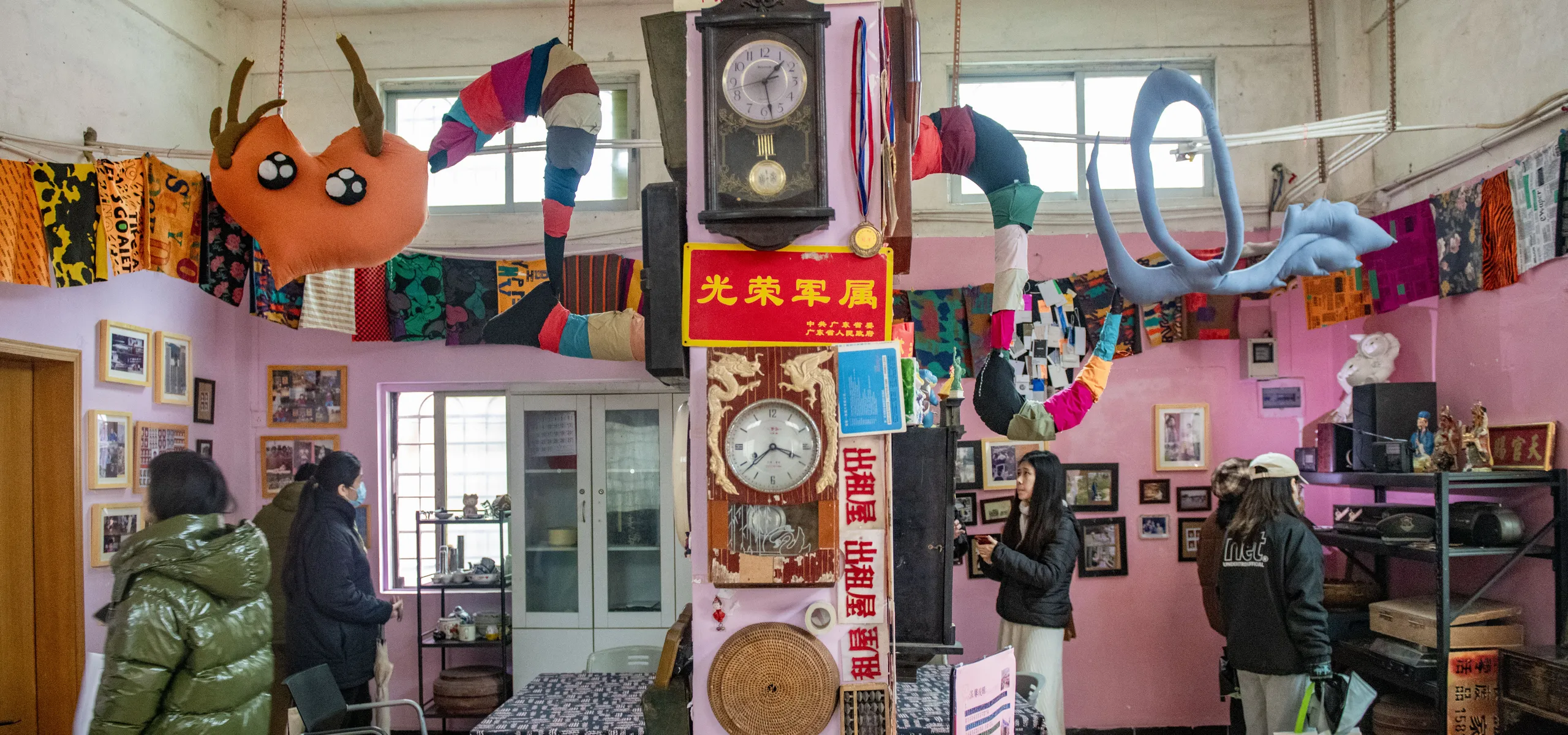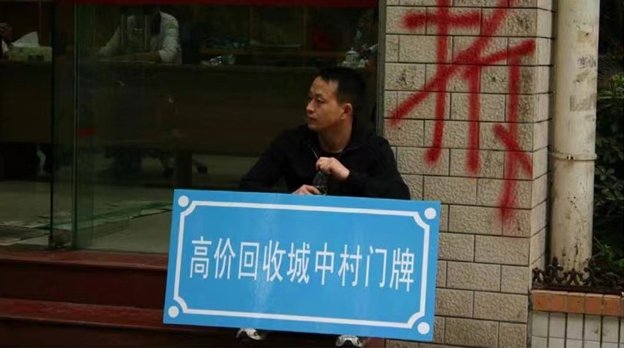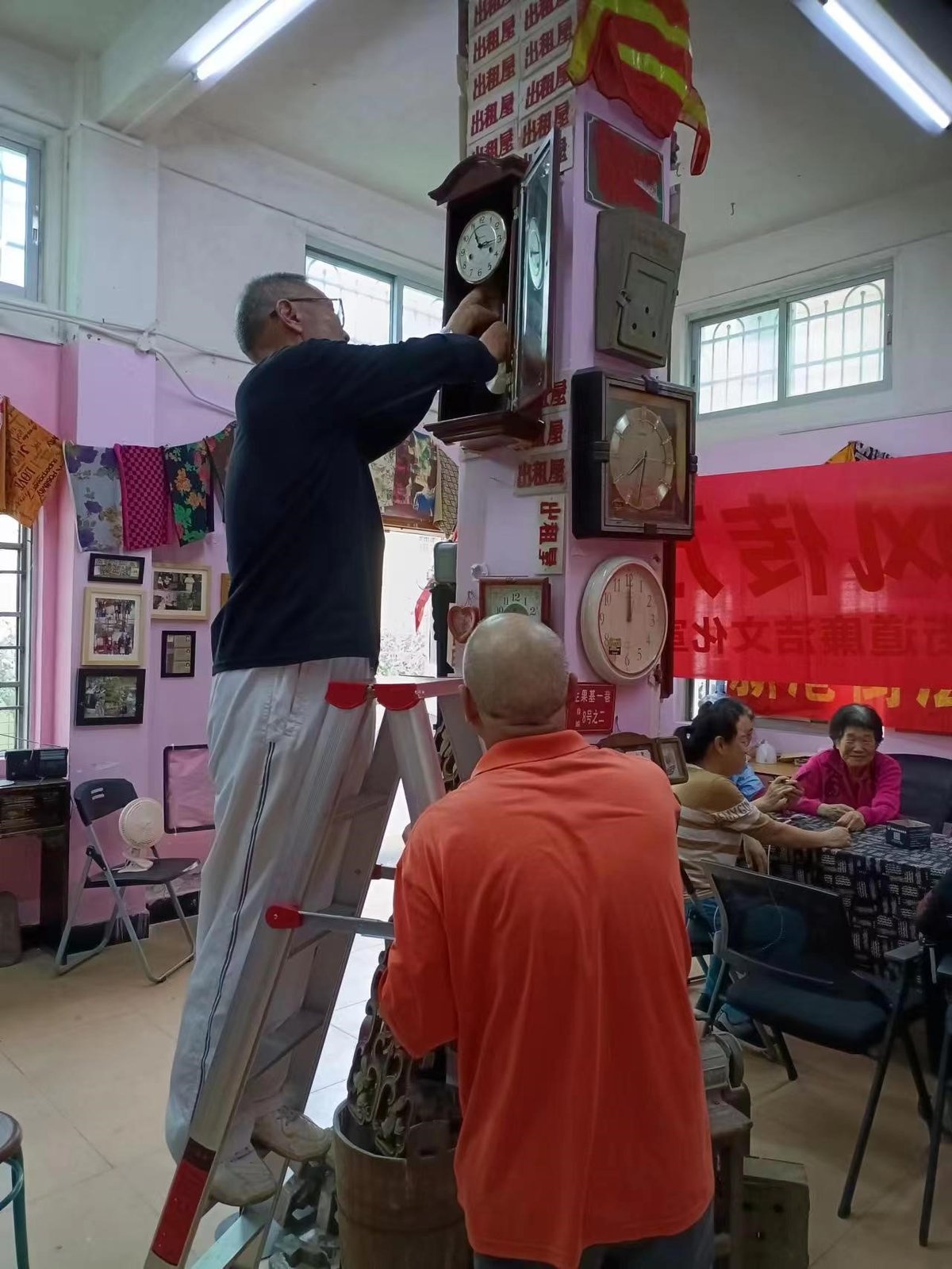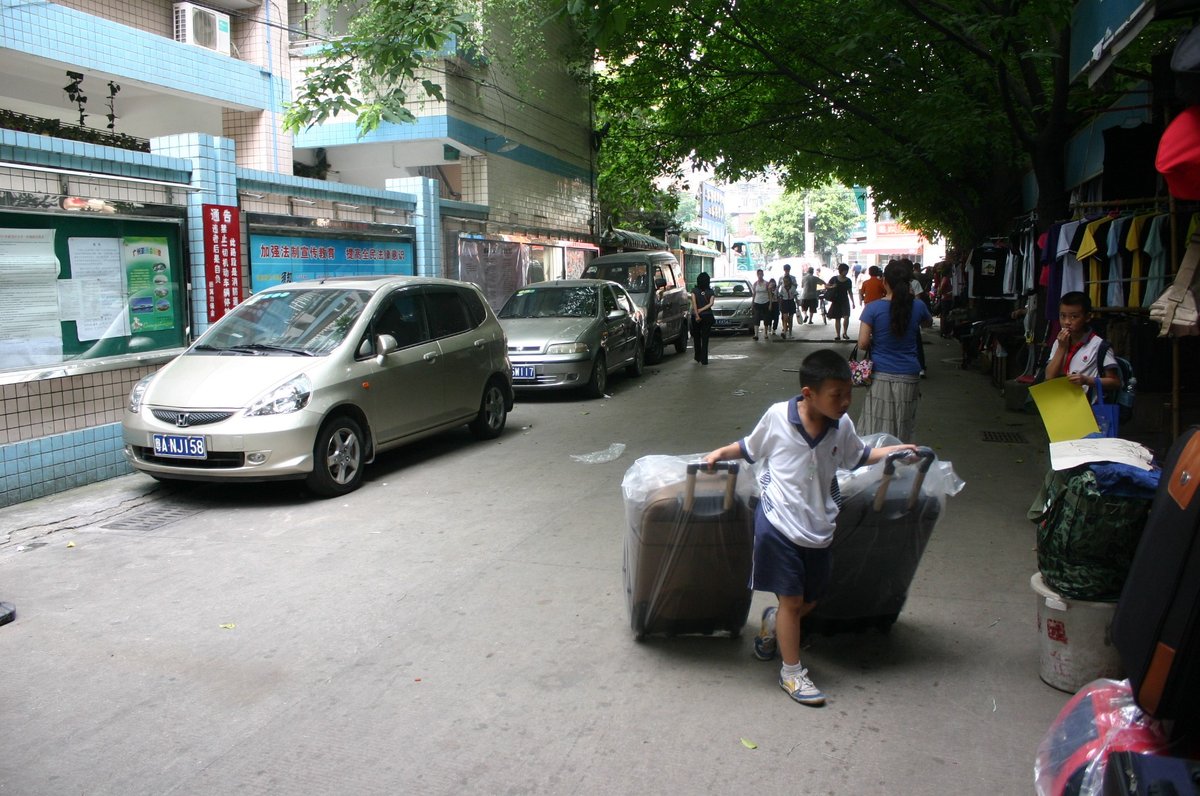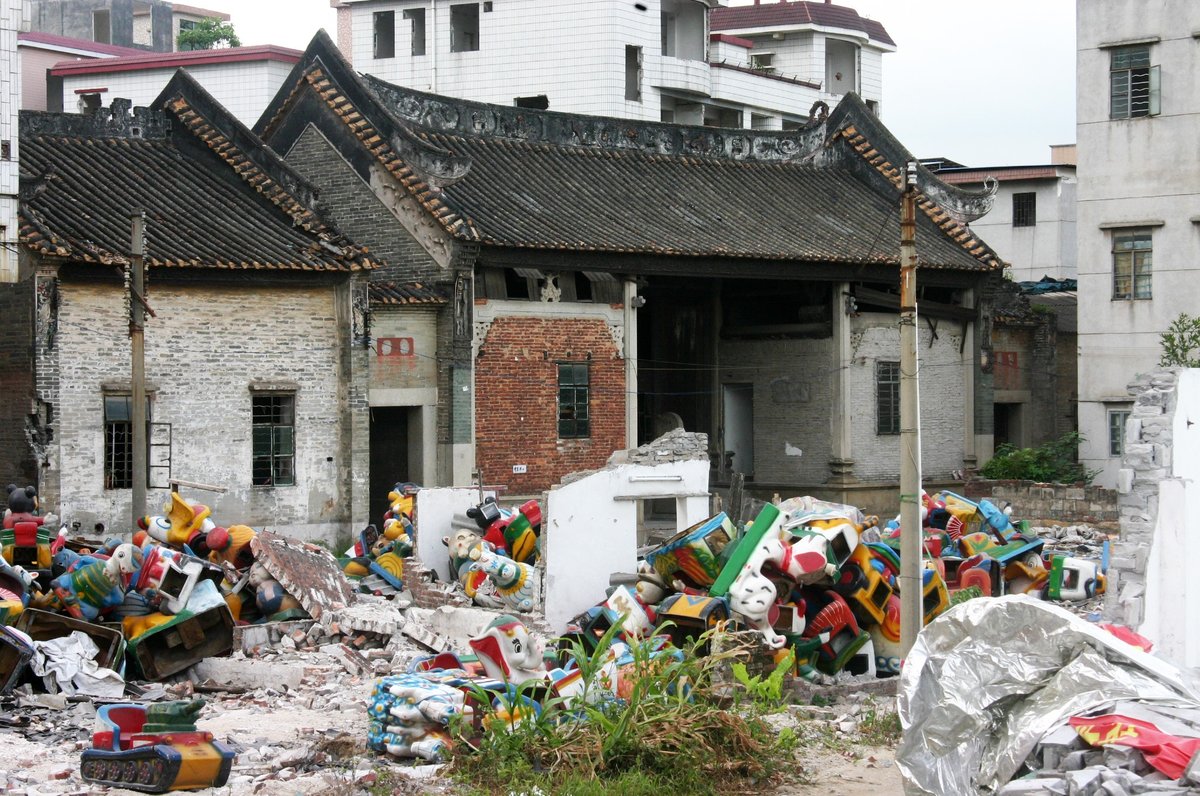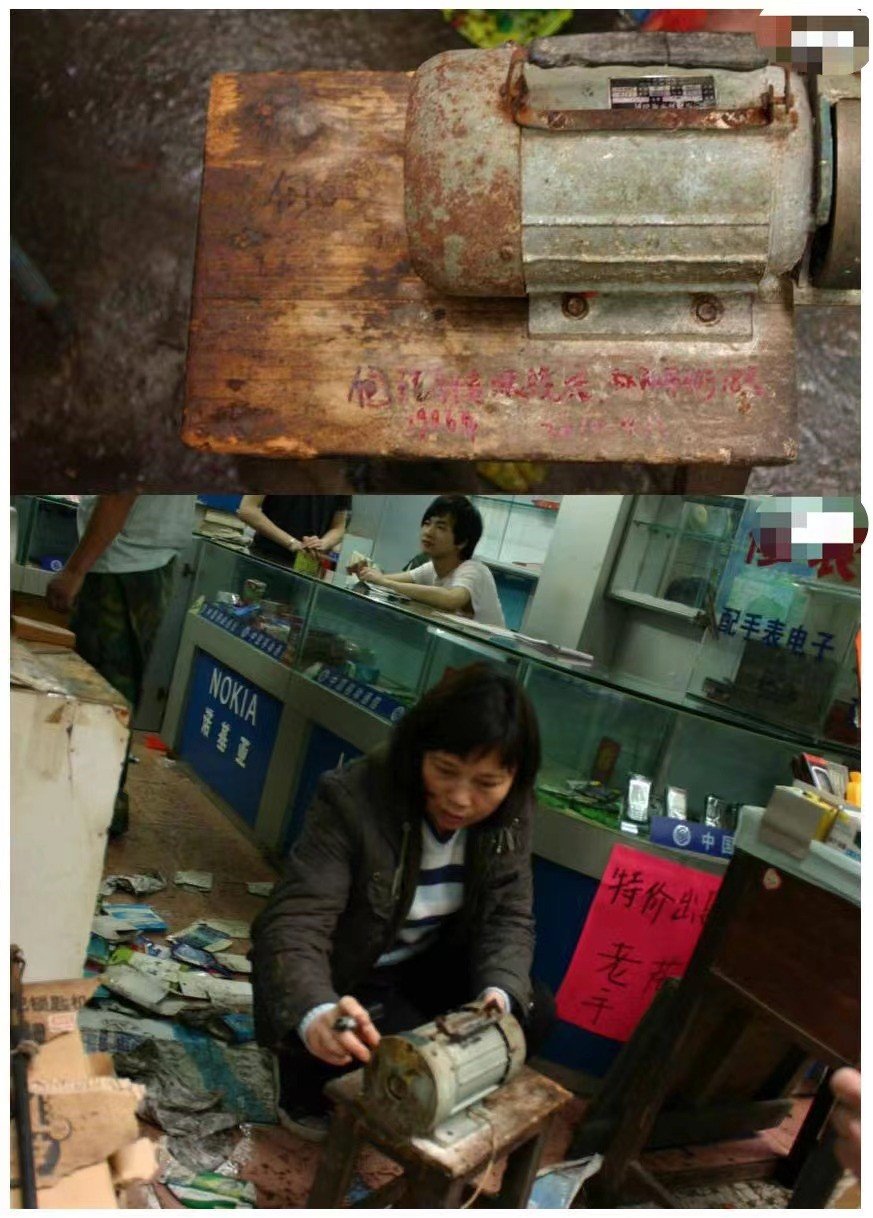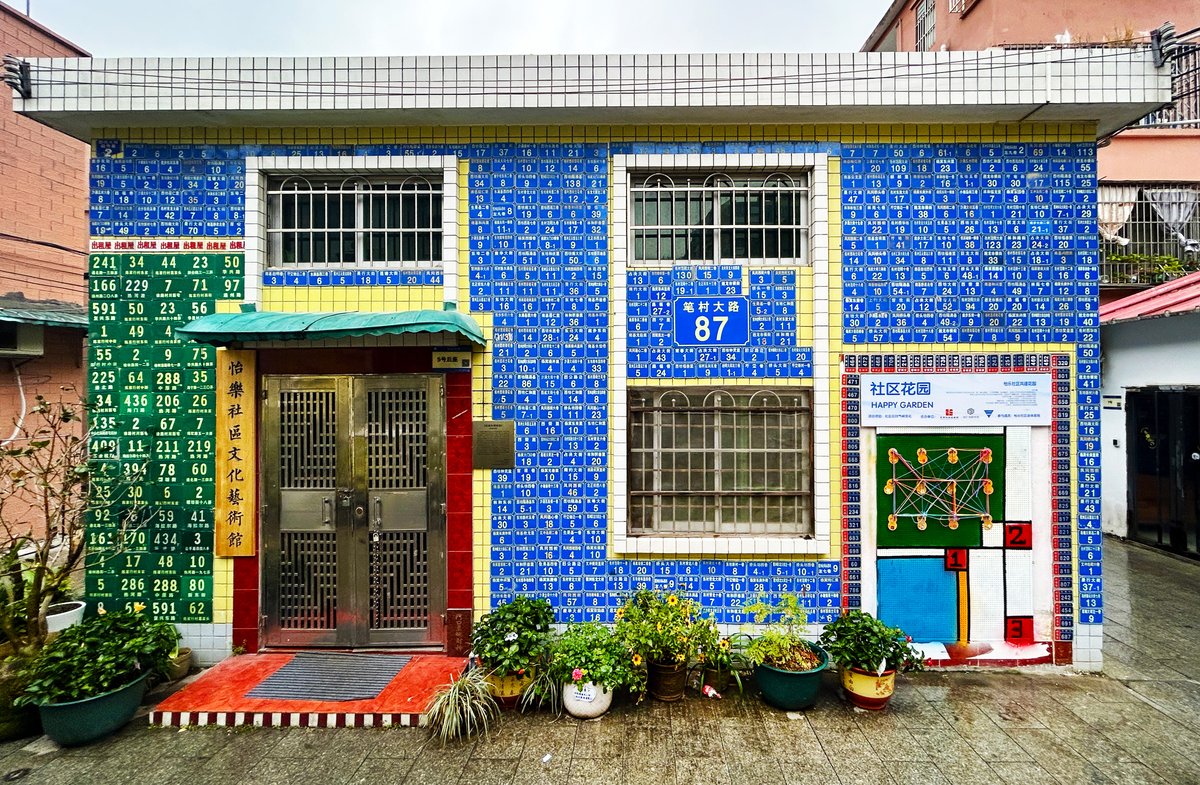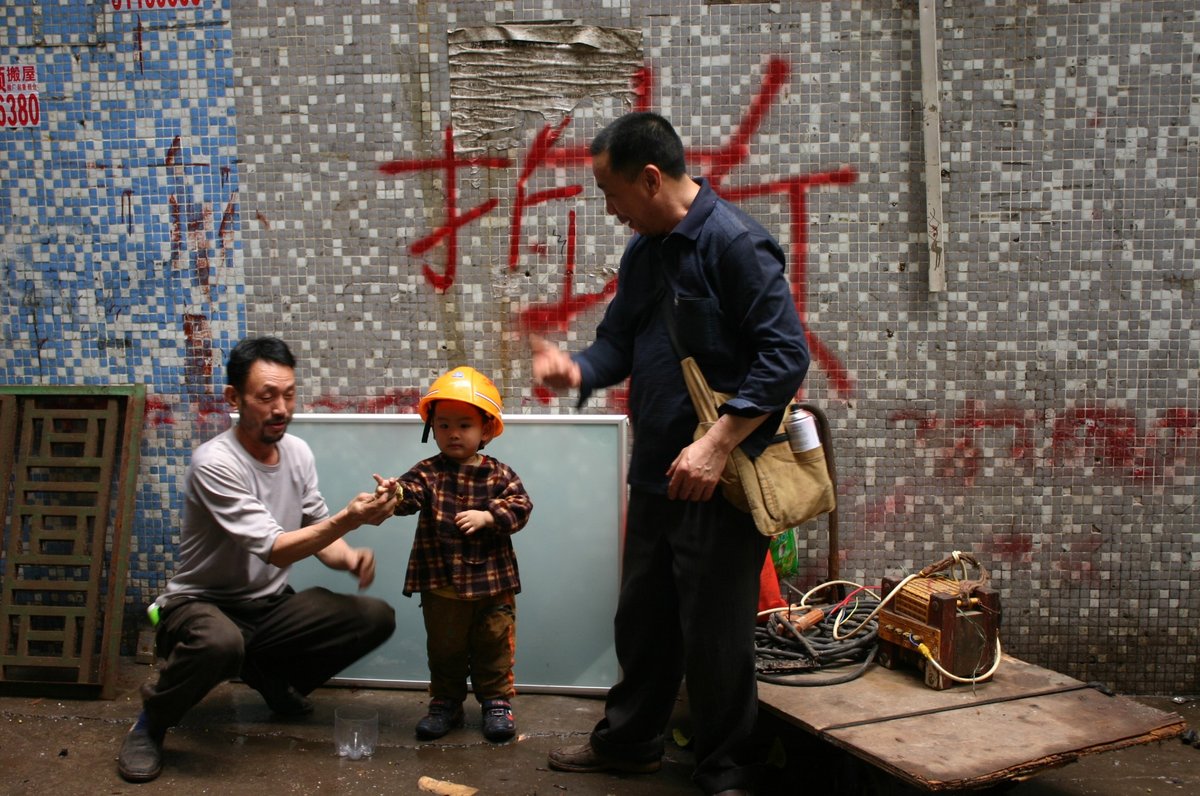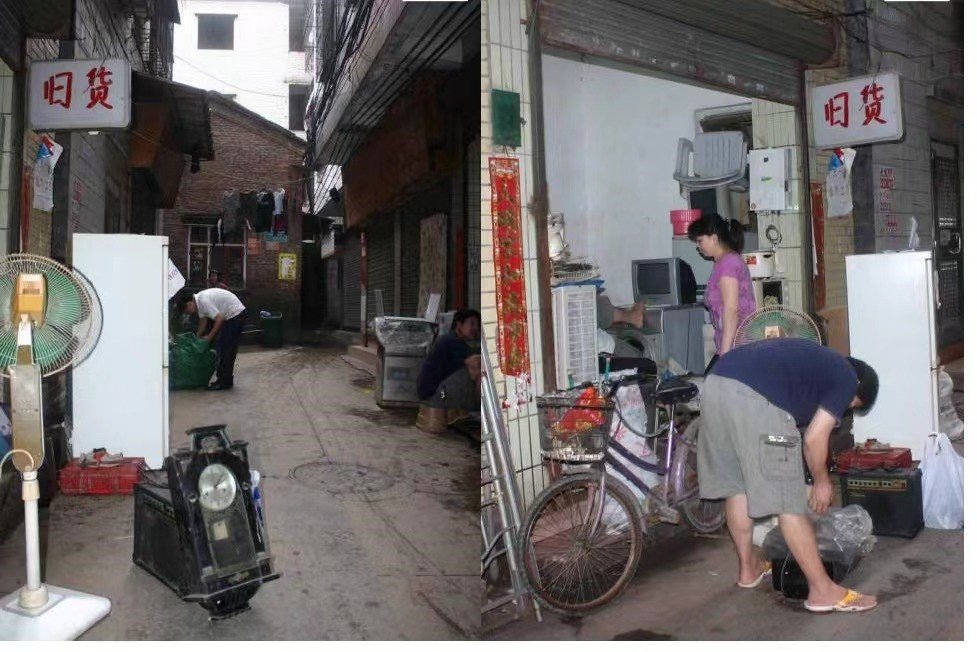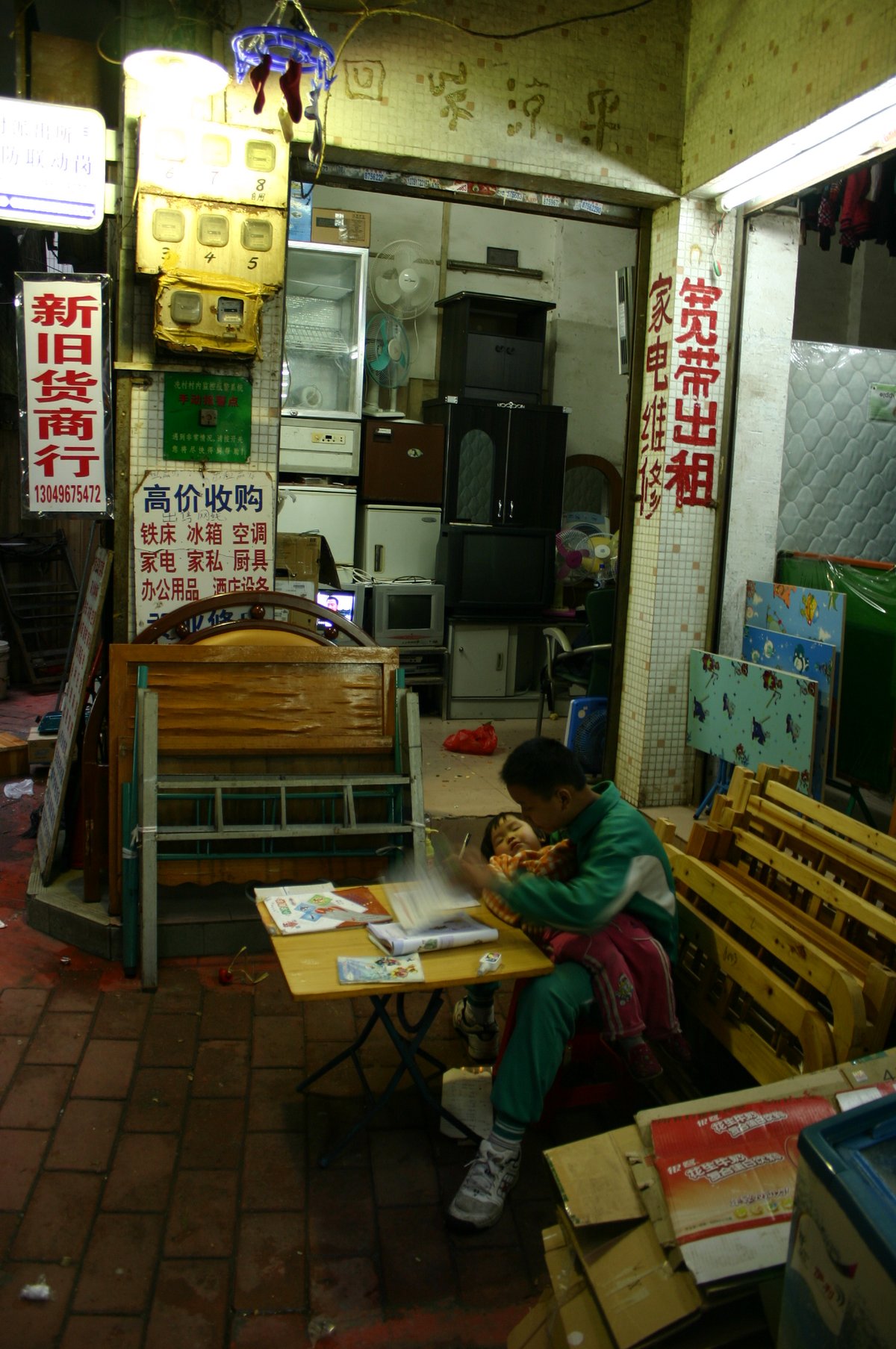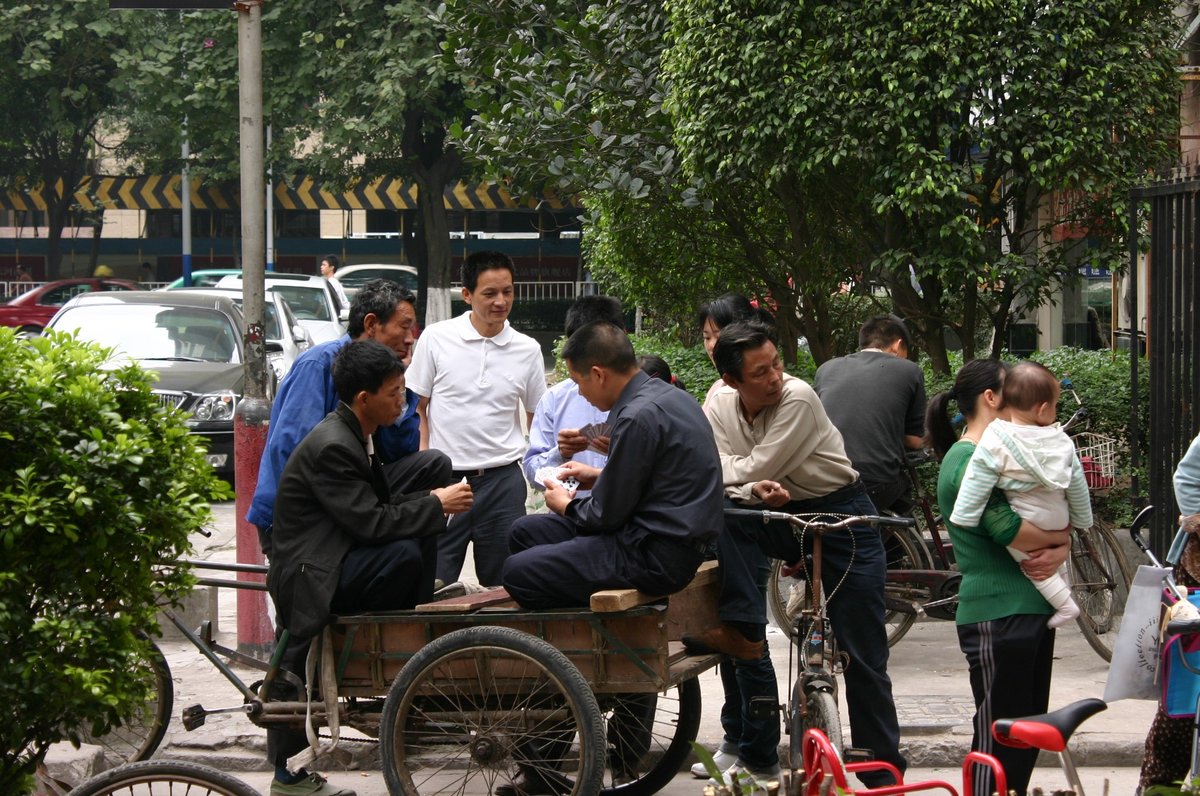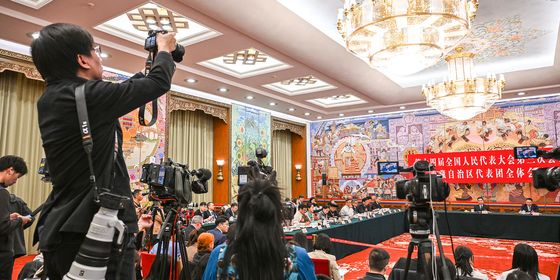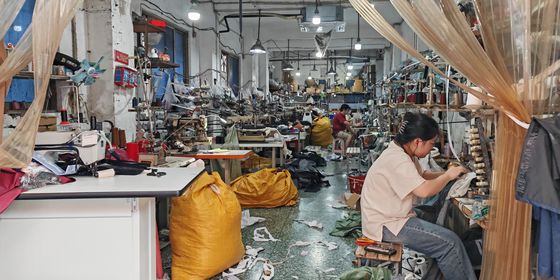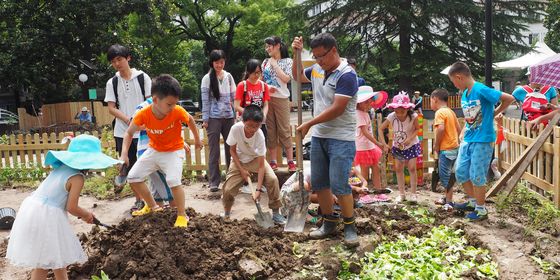How one married couple made a museum out of scavenged belongings, honoring the stories of China’s migrant workers
In Xingangxi, a subdivision of Haizhu district in the city of Guangzhou, lies a stretch of pink one-story houses split by three narrow alleys; its rent is cheaper than those of the surrounding tall buildings. This is Yile (怡乐社区 Yílè shèqū), the “Happy” community. Visitors to the compound find themselves drawn to one particular bungalow, whose blue-green walls are covered with over 2,100 “mosaics.” Each of these mosaics is, in fact, discarded door plates. Fanyang Lane No. 11, Xiancun village, Linhe Jishanli…these names belong to the many urban villages in Guangzhou that have been renovated or demolished. The bungalow itself houses a rather unique museum, managed by married couple Chen Zhou and Zhang Xiaojing. Sixteen years ago, husband and wife began to explore Guangzhou’s vanishing maze of urban villages and lanes, which were once inhabited by migrant workers. Chen and Zhang have since amassed a vast collection of memorabilia: hundreds of house keys, family photos, labor vouchers (prevalent during the Mao era), award certificates, diaries, and more.
But despite Yile’s “happy” name, the items showcased in this museum hold the sad, poignant stories of countless urban villagers.
A wall clock, a murder, and a doll
Residents of urban villages often leave a trail of belongings after they move out. An old man’s passport records the only time he went abroad. In the pages of a diary, a junior high school girl confesses her crush on a female classmate.
Some of these forgotten items offer glimpses into the social fabric of urban villages. A book of police reports, with a long list of possible suspects named by the villagers, details the cases of theft in the community over the years. It seems that theft peaked each year before the Lunar New Year when thieves sought to bring extra money back home to their families. Villagers mobilized accordingly, organizing themselves to guard their communities.
Once in Yangji, Chen was stopped by a Sichuan man who rambled, “It was me! I reported the case to the police and they came to arrest that guy!”
Chen gradually put together the rest of the puzzle. The man was named Yang and had lived there since 1993. He had once witnessed a murder and reported it to the police. However, he ended up being detained overnight as well. “I am a hero!” he yelled. Chen would have slipped away but feared it might anger this zealous guy with his ruddy face, raised fists, and protruding veins. Right then, a full-figured lady came over with pursed lips and a petition. “Hey, Yang, I want to move. Found me a house yet?”
Yang switched gears and became a completely different man. He followed the woman and walked away.
Over the past 16 years, Chen and Zhang have rescued countless objects from the ruins of urban villages. Nothing is too mundane for their collection, which includes blueprints for self-built rural houses, real estate deeds, job applications, accounting books from landlords, tax records from the Republican era, ID documents from the 1960s, vouchers for oil and clothing, stone locks used for practicing kungfu, and even abandoned deity statues. Zhang recalls how she once found an abandoned warehouse, which was littered with brand-new blue-and-white porcelain items, and even cremation urns.
Many of these objects speak to the life of a person, family, or community. A labor voucher reveals that a young girl named Meiling received her work qualification on February 1, 1977. A hairdresser’s manual details the strict routines of the staff, outlining work and rest times down to the minute.
Walking through the empty houses, Chen Zhou saw an unfinished notebook spread out on the tables, its pages watched over by a still-functioning musical bear. On the doorframe of a house, someone had penned a farewell: “The owner of this house has already boarded a train. Linhe village shan’t be shaken for a century to come.” Nearby, on the wall of a photo studio hung a print—a cartoon dog lying by the feet of a little boy. The inscription reads, “Are you homesick, buddy?”
Urban villagers often move out in a hurry, and their children’s feelings are usually last on their minds. In a photo captured by Chen, a mother hastily sorts through toys in the middle of a downpour, while her son struggles to hold an umbrella over her head. Chen recalls the young boy begging her to keep some of the toys, but she snapped at him to be quiet. Clutching the two dolls he can keep, the boy continues to hold the umbrella, his face streaked with tears.
To Chen and Zhang, photo studios are veritable treasure vaults, as migrant workers often need their pictures taken for paperwork. Chen once found unclaimed photos scattered across the floor of an abandoned studio. As he gazed at the faces of these strangers, he couldn’t help but recall his own brothers, who now work in other cities. Chen’s family hails from the Dabie Mountains of Anhui province, and he supported himself with several part-time jobs to afford his studies. Chen and Zhang thus empathize with the migrant workers’ state of “trampled abandonment,” and their efforts aim to restore these workers’ dignity.
Chen and Zhang studied abroad in France before returning to China in 2007. While Zhang took up a teaching position at the Guangzhou Academy of Fine Arts, Chen became an independent artist. His career granted him much free time, which he filled by wandering around town. It was during one such walk that he noticed a row of discarded jars, which workers sometimes used as “street refrigerators” to store rice and wine in the sweltering heat. Chen remembered wanting to take these jars home, though he had no place to store them. A few days later, when the couple returned for a second look, local children had stoned the jars to smithereens.
In January 2024, Zhang and Chen created a “Found Museum,” showcasing some of their collections. Among the pieces on display was a 17-meter scroll composed of over 40 glued-together certificates of merit. Most of the certificates originally belonged to a girl named Xu Xiaohui, who hailed from Linhe village in Guangzhou. Her family had left the proof of her academic accomplishments, from kindergarten to middle school, behind on the walls when they moved.
Zhang and Chen kept the certificates and were eventually contacted by Xu Xiaohui’s father, who heard about the artwork through media coverage a few years ago. He informed them that the family had returned to their native countryside in Zhanjiang, Guangdong province. Unfortunately, Chen lost his contact information when he changed phones. “Xiaohui must be about 28 years old now. I wonder how the family is doing now.”
The Found Museum caught the attention of many locals. Among them was an elderly man who had spent most of his life working at a Guangzhou electronic clock factory and was excited to see the clocks featured in the exhibition. He was obsessed with clocks and had hung five of them at home, much to his wife’s annoyance. He ended up donating one to Chen and Zhang’s museum.
He was not the only donor. A housewife sent records and VCDs from her late father-in-law’s collection. Though the old man had been dead for two decades, his possessions revealed once-forgotten details of his life. He was a college graduate born in Hong Kong. As a music lover, he often took a tape recorder to his nearest senior university for his fellow seniors to sing and dance together during his sunset years. The housewife’s husband, an avid reader, has also passed away. He had a whole box of certificates and she wondered whether these documents could be useful to Chen and Zhang.
“Make a killing recycling door plates”
The restaurant where Aunt Ping used to work stood right next to Zhang and Chen’s Found Museum. As soon as she opened the door, she felt right at home among these “familiar antiques.” There was a sewing machine much like the one she’d used as a girl. When the adults were away working, she had pierced her hand with the needle.
In 1996, Aunt Ping packed light—carrying nothing but a change of clothes and a portrait of her son—and moved from her native Henan province to Guangzhou, where she found work as a nanny. Aunt Ping lived with her employer until her family joined her in 2007. Her son took a job as a chef, and her husband worked as a security guard.
Though urban villages are noisy and rowdy and often lack safe living conditions, they offer migrant workers a cheap and convenient place they can call home, especially for those who have freshly arrived in town. In the midst of the villages’ clamor and chaos, one can still find oases of domesticity and care, such as a food stall manned by a family. A boy of six or seven years old completes his homework under a dim light, his toddler sister in his arms, while their parents call out to customers.
Sometimes, urban villages can also provide a space for renegades and their dreams. This is the case of an elderly man named Liang Bo, who has covered his entire house, from the floor tiles to the roof, with his heterodox works of calligraphy. He is no traditional master and relies only on his understanding of the world as an old rural man. One of his pieces reads: ”Why fear dusk when the sunset is infinitely beautiful?”
Sometimes, Chen and Zhang receive tips on villages to visit. In 2010, a journalist informed them about the scheduled demolition of Linhe village, which was located just across from the Guangzhou East Railway Station. The journalist, like many migrant workers, had once lived in the village when she first arrived in Guangzhou fresh out of college. She advised them to take a look before it was too late.
When the couple arrived at Linhe, a female shop owner had yet to vacate her stall. The woman had been in business since 1983, selling mobile phones, repairing watches, and fixing glasses with a rusting motor. Chen bought the rusting motor from her for 20 yuan, and the woman used a red marker to write the start and end dates of use on the motor: from 1986 to April 11, 2010. This is the first object the couple collected for the museum.
Chen and Zhang first undertook their excursions with helmets and shovels, which was all they could afford at the time. They did not have a car, so they went by bus to each location. Chen discovered that he was allergic to certain materials after a few trips to the villages caused him to break into hives.
After a while, Chen and Zhang came up with the idea of collecting door plates from abandoned homes. They devised a system: Chen would pry the plates off the walls while Zhang used an umbrella to shield him from the debris. Trash collectors thought they were scavenging plates for money, and advised them to avoid those made of worthless aluminum in favor of the sturdier steel plates.
Later, to demonstrate the value of a door plate, Chen turned to performance art. He squatted in a corner of the village with a sign upon which he’d scribbled the slogan, “Make a killing recycling door plates.” The incident caught the attention of the media and eventually the suspicion of the police, though the latter let him off after learning of his true intentions—to protect the names of these locations. He eventually becomes good friends with the police. One day, the police called Chen to the station. No sooner had he entered than a policeman said: “We fought hard for you all night. Here, take these door plates as a gift!” As it turned out, the media’s coverage of Chen’s performance had encouraged people to take the slogan literally, with some scavengers even sneaking into the village late at night to steal door plates. The police caught the culprits and seized the stolen items, gifting them to Chen as a token of friendship.
Some villagers also handed over their door plates as souvenirs. Inspired by the couple, an old woman took her old door plate with her when she moved, stating that she wanted future generations to remember the place she had lived. Another woman had placed old door plates in each room of her family’s new home, worried that her father-in-law would have a hard time getting used to the apartment building after he’d spent most of his life in their former urban village.
A long-gone gold rush dream
Any visitor to an urban village is immediately swept into a dirty, chaotic, and lively microcosm. Cramped buildings only allow for one bicycle to pass at a time. Neighbors may shake hands by reaching out of their windows. Every inch of space is covered with houses, so much so that there is hardly a patch of sunshine, and lights stay on during the daytime. Everyone keeps busy, including the group of streetwalkers whom Chen once witnessed dumpster-diving. They were five or six young women sporting exaggerated makeup, rouge, and miniskirts, laughing as they fought over discarded artificial flowers in the garbage. They said that the flowers, in bright red and green, were very pretty.
In the 1990s, when jobs were no longer allocated by the government, many highly educated, ambitious youth migrated south to work. Among the residents at Shipai village were many white-collar workers employed in the nearby Computer Mall, including Ding Lei, the future founder and CEO of NetEase, as well as Wutiaoren, the rock band that took over the Chinese internet in 2020. In an interview with writer Xu Zhiyuan, the members of Wutiaoren spoke fondly of their time in Shipai village. “It was a world of its own,” they said. “You could find everything there, and for cheap. It was the ideal atmosphere for our youthful, hormone-addled selves.”
Once, Chen was wandering in Linhe with a French man when a young woman rushed over and addressed them in English. She was an English major at Qingdao University in the 1990s but ended up selling women’s lingerie and cosmetics in Guangzhou after graduation. Here, she got married and had two children. But now, Linhe was to be demolished and her life would be upturned. She had lost contact with her former classmates long ago, and returning home wasn’t an option. How disgraceful was her life for a college graduate? Chen listened to her story, then shared his aspirations to open a museum dedicated to the stories of migrant workers. The woman removed a bronze mirror from the wall and presented it to him. It was her mother’s wedding present. She received it as a gift when she decided to pursue this “gold rush dream” in the South.
Chen is often mistaken for a reporter as he carries a camera with him at all times. But villagers don’t mind his actual identity and are willing to talk to him anyway. Chen was once approached by a middle-aged man who had settled in the village after marrying into his wife’s family. Now, with the village scheduled for demolition and his water and electricity already cut off, the man still refuses to vacate the house he shares with his dogs. He was more than eager to tell Chen about his experience living in the urban village.
A used furniture stall owner from Jiangxi province also took Chen’s invitation to share his story too. He’d made his way to Yangji village in the 1980s, and his business prospered from the high turnover of migrants seeking second-hand furniture. He had never needed to seek his livelihood elsewhere, but he now feared for his business in the face of forced relocation. The salesman knew he would most likely have to return to his hometown, where the cropland had long been abandoned. Overwhelmed with fear and sadness, he cried out: “Isn’t there any need for businessmen like me in Guangzhou?”
After the interview, the shop owner gifted Chen a speaker, upon which he’d written the following words: “I hope Guangzhou can always hear the voice of Jiangxi people.” However, just two days later, Chen was unable to find him. The man had packed up shop and left.
Relocation for these residents is never peaceful. The owner of a noodle shop was in dispute with the landlord and had come to be known as the last “nail householder (钉子户)” of Linhe village as he refused to vacate the establishment. Chen went to have a bowl of noodles at the shop and overheard the shop owner telling a mediator: “Bring us the compensation and we’ll get out of here right away.” The mediator returned with a suitcase full of money, and the shop owner picked up a stool and threw it outside.
Xu Yao, a resident of Yile community, is fairly knowledgeable about the history of urban villages. A native of Guangzhou, he graduated in the 1990s and worked in the sales department of a foreign company. To get away from his parents, he rented a small rooftop room in Shipai village. At around 5 square meters, the room could barely fit a bed. However, the entire rooftop spanned nearly 100 square meters and was equipped with a tiny shower room. This was tantamount to a mansion for Xu Yao, who often welcomed his musician and artist friends to the rooftop to gather, shower, drink, and sing English songs. Because urban villages are naturally noisy, he and his friends were not a nuisance to others.
Now, Xu Yao has called Yile home for nearly four decades. Many state-owned companies have residential units here, some of which are divided into small single rooms and rented out to migrant workers. A room of 10 square meters goes for one thousand yuan a month. Most of the residents are elderly people, though some younger delivery workers have joined their ranks. Xu Yao feels that he has witnessed the different lives of two generations of the working class—“one as masters and the other only passing by.” “Some people give a lot but get awfully little in return,” he said.
Xu Yao’s experience in real estate had put him in close contact with many contractors, who would bring their family members to work and live in these container-style dormitories. “You get these contractors who have no place to call their own, despite building so many houses,” he said. Xu Yao observes that most of these migrant workers arrive in Guangzhou in their twenties or thirties and work here until retirement. Their children’s job options are limited: Most sell insurance or deliver food. Additionally, migrant workers are rarely able to participate in communal activities. After a grueling day of work, their sole form of leisure is to set up a table in the square for a little barbecue.
Many migrant workers take to social media to share their memories of their past lives in the urban villages. “I first came on my own to Xiancun village back in 2009, and now it has been demolished and rebuilt into a new village. I really miss the old times. You could score a cup of milk tea for 2.5 yuan.” “How many times I’ve dreamt of the familiar streets of Yangji village, bustling with people, only to wake up and realize it was all just a dream!”
As these workers grieve their collective past, nobody quite knows the whereabouts of the drifters whose belongings are now on display at Chen and Zhang’s Found Museum. Maybe they were forced out of their homes and pushed further down Guangzhou’s subway lines toward the suburbs. Or maybe they did make their gold rush fever dream a reality. Nobody can know for certain.
(All names quoted in this article are pseudonyms, except for Zhang Xiaojing and Chen Zhou. Unless otherwise noted, the pictures are provided by the narrators.)
Written by Jiang Wanru (姜婉茹)
Edited in Chinese by Tao Ruogu (陶若谷)
This story was originally published in Chinese on the public WeChat account Jizhou Studio. It has been translated, edited, and republished with the author’s permission.





